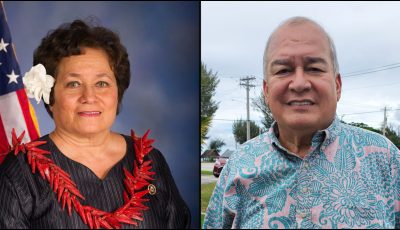Kilili bill backs 902 team immigration goals
WASHINGTON, D.C.—Congressman Gregorio Kilili Camacho Sablan (Ind-MP) introduced last Thursday legislation that reflects the immigration policy proposals presented by Gov. Ralph DLG Torres and his team of negotiators in Section 902 consultations with the White House in June.
“I made a commitment to the Governor to introduce legislation in the U.S. Congress that would support the immigration policies he put forward in 902 consultations and today I kept that promise,” Sablan said.
Sablan had drafted a bill for introduction, when the Governor came to Washington in June to meet for the first time with the President’s Special Representative for the 902 talks. Additions by the Governor’s negotiating team after arrival, however, required that draft bill to be revised. The bill introduced today now more fully reflects the Governor’s policy positions.
Section 902 consultations are a means of resolving issues affecting the relationship between the United States and the Northern Mariana Islands. Section 902 is part of the Covenant of Political Union that established the relationship in the 1970s.
Immigration has been a problem for the Northern Mariana Islands ever since the local government opened the door to tens of thousands of foreign workers beginning in the early 1980s. The federal government took over management of immigration in 2009 and has since reduced the number of foreign workers to about 13,000, about half the total workforce in the islands. But new economic growth has led to pressures to increase that number again.
Sablan has been engaged in extensive listening sessions with the business community, workers, legislators, and the general public in the Marianas. He also consulted closely with the Governor to align their policy positions.
“Realistically, the chance of getting immigration legislation, as complex as the bill introduced today, enacted in this Congress is slim,” Sablan said.
“Immigration is one of the most hotly contested areas of debate in our nation right now. Besides, with Congress leaving today for a seven week break and another six weeks off before the November election there is very little time to get legislation enacted.
“But putting all of these ideas out in the open is an important step. It demonstrates that there is agreement among Commonwealth leaders.”
The governor proposed—and Sablan’s bill includes—extension of the current immigration transition period until 2029. It keeps in place a plan to cut the number of foreign workers allowed under a special Northern Marianas-only program to zero by the end of that period. But the bill resets the starting point for the cuts from the current 12,999 to 18,000, leaving more room to accommodate the current investment boom.
Sablan was previously successful at extending the transition period from 2014 to 2019. He accomplished that two years ago in Public Law 113-235. But even with the extra time to replace foreign workers the number of U.S. workers in the Northern Marianas has remained virtually unchanged.
In response, the new legislation looks for more accountability on how training funds are used to help bring U.S. workers into the economy. Sablan introduced legislation, H.R. 2200, in 2013 that required the Commonwealth government to submit a plan of expenditure each year with specific goals for the number of U.S. workers the training funds will produce. H.R. 2200 also required a report to Congress on whether those job goals had been met. Both requirements are now part of the Governor’s 902 policy position.
The new bill also will require that employers in the Marianas pay the prevailing wage, typically more than the minimum wage, to foreign workers. This policy both discourages the use of foreign workers by making them more expensive and at the same time encourages U.S. workers to take jobs that are now paying a higher wage.
Once in Washington, the Governor and his 902 team also added the provision that Congressman Sablan had successfully included in the comprehensive immigration reform bill, S. 744, passed by the Senate in 2013. That provision gave foreign workers, who had been living legally in the Northern Marianas for over ten years, the ability to continue living and working in the islands. After another five years those workers could apply for U.S. permanent resident status. The intent was to stabilize the local economy by keeping in place long-time employees, who would otherwise have to leave as the total number of foreign workers was cut to zero. The House never acted on S.744.
Sablan said he was grateful that the governor had taken these previous legislative proposals and added them to the 902 negotiating position.
The governor’s 902 negotiating team includes Commonwealth Labor Secretary Edith DeLeon Guerrero, Public Lands Secretary Marianne Teregeyo, Governor’s chief of staff Matt Deleon Guerrero, Governor’s legal counsel Wesley Bogdan, Senator Arnold Palacios, Representative Angel Demapan, Tinian Mayor Joey San Nicolas, Rota Mayor Efraim Atalig, Saipan Chamber of Commerce officer Alex Sablan, and legal advisors Rose Villazor and Matthew Adams.
Interior Assistant Secretary Esther Kia’aina is the President’s Special Representative.
Section 902 consultations are expected to continue for the next several months. A final report to the President is planned for this December. (PR)



























